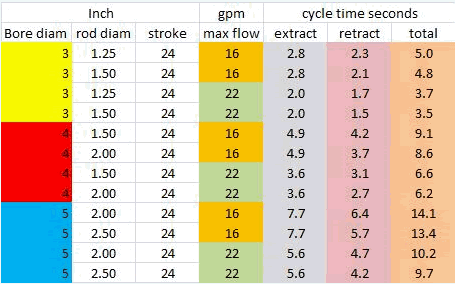Sorry, I missed this awhile back and failed to respond. The 11 GPM pump is a bit underdesigned. A 13 GPM pump is better matched against a 6.5 HP engine, which could likely also drive a 16 GPM pump. Cylinder size is also a factor. All three have to be co-ordinated.I dont understand why the engine would be oversized. If you run it at half speed it wouldnt turn 3600 rpms. Just curious.

Note that if you have too much HP with the engine and a small cylinder, your cycle time will be too fast, and you have to slow the RPM down. On the other hand, a large cylinder slows the cycle time to a crawl, even with a 16 GPM pump.
When you eventually build or buy your splitter, study the numbers shown above. Regardless, make sure you are using a 2-stage pump that will drop down for more pressure when the going gets tough. In my neck of the woods, the going seems to get tough rather often.

























































